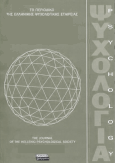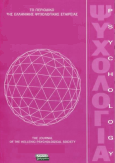Εργαζόμενες μητέρες στην Ελλάδα κατά την πανδημία COVID-19: Η νοηματοδότηση της «καλής μητρότητας» σε συνθήκες lock-down και τηλεργασίας

Περίληψη
Η εμφάνιση της πανδημίας COVID-19 στην Ελλάδα τον Μάρτιο του 2020 προκάλεσε πολλές αλλαγές στην καθημερινή ζωή. Τα καθήκοντα των μητέρων κατά τη διάρκεια της πανδημίας αυξήθηκαν δραματικά, καθώς η εξωτερική υποστήριξη για τη φροντίδα των παιδιών ήταν πρακτικά ανύπαρκτη. Οι εργαζόμενες μητέρες έπρεπε να διαχειριστούν τους διαφορετικούς ρόλους και τις ταυτότητές τους ταυτόχρονα, καθώς η τηλεργασία έγινε υποχρεωτική. Το άρθρο έχει ως στόχο την κατανόηση του τρόπου με τον οποίο αντιλαμβάνονται την «καλή μητρότητα» οι σύγχρονες εργαζόμενες μητέρες στην Ελλάδα, λαμβάνοντας υπόψη τις ιδιαιτερότητες της πανδημίας. Οκτώ εργαζόμενες μητέρες με παιδιά ηλικίας 3 έως 18 ετών από διάφορες περιοχές της Ελλάδας ανταποκρίθηκαν σε δημόσια πρόσκληση που αναρτήθηκε σε δημοφιλή πλατφόρμα κοινωνικής δικτύωσης. Συμμετείχαν σε μια διαδικτυακή ημι-δομημένη συνέντευξη κατά τη διάρκεια της οποίας κλήθηκαν να μιλήσουν για την εμπειρία τους από το lock-down σε σχέση με τον ρόλο τους ως εργαζόμενες μητέρες. Οι συνεντεύξεις μεταγράφηκαν και αναλύθηκαν χρησιμοποιώντας την Ερμηνευτική Φαινομενολογική Ανάλυση (IPA). Ένα κοινό θέμα που προέκυψε από τις ιστορίες τους ήταν η εμπειρία της απώλειας του ελέγχου της ζωής τους και πιθανώς της απώλειας των πολλαπλών διαστάσεων της ταυτότητάς τους, που φαινόταν να έχει περιοριστεί απλά σε αυτήν της μητέρας. Οι ιδεολογίες για το φύλο και τη γονεϊκότητα που υπήρχαν πριν από την πανδημία συνεχίζουν να επηρεάζουν τις εμπειρίες των εργαζόμενων μητέρων και κατά τη διάρκεια της πανδημίας.
Λεπτομέρειες άρθρου
- Πώς να δημιουργήσετε Αναφορές
-
Ψάλτη Α., & Αντωνίου Χ. (2023). Εργαζόμενες μητέρες στην Ελλάδα κατά την πανδημία COVID-19: Η νοηματοδότηση της «καλής μητρότητας» σε συνθήκες lock-down και τηλεργασίας. Ψυχολογία: το περιοδικό της Ελληνικής Ψυχολογικής Εταιρείας, 28(1), 63–77. https://doi.org/10.12681/psy_hps.31518
- Ενότητα
- ΕΙΔΙΚΟ ΑΦΙΕΡΩΜΑ

Αυτή η εργασία είναι αδειοδοτημένη υπό το Creative Commons Attribution-ShareAlike 4.0 International License.
Το περιοδικό ΨΥΧΟΛΟΓΙΑ έχει υιοθετήσει μία πολιτική Platinum open-access. Τα έξοδα υποβολής, επεξεργασίας ή δημοσίευσης των εργασιών καλύπτονται από την Ελληνική Ψυχολογική Εταιρεία. Τα πνευματικά δικαιώματα των δημοσιευμένων εργασιών προστατεύονται από την άδεια 'Creative Commons Attribution-ShareAlike 4.0 International'. Οι Συγγραφείς διατηρούν τα Πνευματικά Δικαιώματα και χορηγούν στο περιοδικό το δικαίωμα της πρώτης δημοσίευσης. Η άδεια αυτή επιτρέπει σε τρίτους, να χρησιμοποιούν την εργασία σε οποιαδήποτε μορφή, με την προϋπόθεση της διατήρησης των διατυπώσεων που προβλέπονται στην άδεια σχετικά με την αναφορά στον αρχικό δημιουργό και την αρχική δημοσίευση στο περιοδικό ΨΥΧΟΛΟΓΙΑ. Επιπλέον, κάθε διανομή της εργασίας οφείλει να γίνεται με τους ίδιους όρους διανομής, δηλαδή με την ίδια άδεια Creative Commons.




